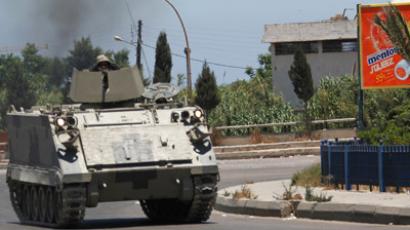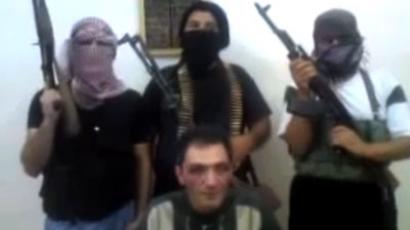Beirut blast: Who serves to gain?
The deadly blast in Beirut which killed eight and wounded 118 more has risked destabilizing Lebanon while civil war rages in Syria. Middle Eastern analyst Ali Rizk told RT that the one with the most to gain from the attack was not Syria, but Israel.
RT: So you are there in the city, how would you assess the situation there right now?Ali Rizk: Lakhdar Brahimi, the UN envoy to Syria, he was here in Beirut just two days ago. In his statements, he said that he was very afraid that the conflict or unrest in Syria could not stay within Syria’s borders forever, and that eventually, if it continues, it will go beyond these borders.Now, two days after he made these statements, this massive, massive blast – I was at the scene for a couple of hours –we already have the political element coming into play. Some elements of the March 14th movement, which is known to be anti-Bashar al-Assad, even before it was known who was killed in this explosion, they quickly pointed the fingers at the Syrian government. And now with [senior Lebanese intelligence official ]Wissam al-Hassan, the head of internal security has been killed or targeted, is known to be pro-March 14th [and not an ally] of the Syrian government. This will only lead to more and more fingers [being pointed] from March 14th, and from their Western allies being pointed at Syria. [It is] similar to the situation we witnessed when [former Lebanese prime minister] Rafik Hariri was assassinated.
Named after the date of the Cedar Revolution, the March 14th alliance was a coalition of political parties formed in the wake of the 2005 assassination of former Lebanese prime minister Rafik Hariri. United by their anti-Syrian stance, the group pushed for a lessening of Damascus’ influence on internal Lebanese affairs, the establishment of a commission to investigate Hariri’s assassination, the resignation of security officials, and the organization of parliamentary elections. The Cedar Revolution secured a withdrawal of Syrian troops from Lebanese soil that same year.
RT: What do you make of the accusations that the Syrian government is behind the blast?AR: The question that must be raised in all cases is who benefits from such an act? If the Syrian government goes ahead with [such] acts – we don’t have any information – but if it does…I think it’s only endangering itself and committing suicide. Is the Syrian government as such a suicidal government? I myself don’t [think] so.The side which benefits maybe would be Israel. This might be a coincidence, but it might not be. Hezbollah actually sent an unmanned drone into Israeli airspace just a few days ago. So could this be a response from Israel…because many are saying that Israel doesn’t have the ability, that it now cannot actually wage a war against Hezbollah and against Lebanon. So has Israel resorted to creating internal instability inside Lebanon with the aim of keeping Lebanon preoccupied with itself and taking it out of what we refer to here as the resistance axis, which includes Iran, Syria and Hezbollah? We also must not forget the potential of Israel playing a role.The fact that many of the al-Qaeda elements and the extremists who are fighting the Syrian government inside Syria, it is said that many of them have fled over here into Lebanon from the city of Homs and taken refuge. The explosion we saw today – car bombings – indeed do bear the traces of al-Qaeda, it affiliates and even some foreign intelligence sources.RT: As you mentioned, after the Special Envoy to Syria did warn that the Syrian conflict could spread beyond Syria itself. You’ve just been talking about Israel, we’ve seen the events in Lebanon, and of course we’ve been reporting about the impact on Turkey. Which other countries now could be affected by the Syrian crisis?AR: The Syrian crisis, as I said, could affect the whole region. We also have Iraq. Iraq could be very much involved, especially taking into consideration al-Qaeda and its presence there. The whole region could be set ablaze. Even some of Syria’s foes, like the United States and the Obama administration, have warned of the regional repercussions of the ongoing Syria unrest. So I think the whole region is exposed, and so for this reason it is necessary for there to be a judgment to the initiative by Lakhdar Brahimi, who focused on seeking a ceasefire on the Muslim holiday of Eid al-Adha.













